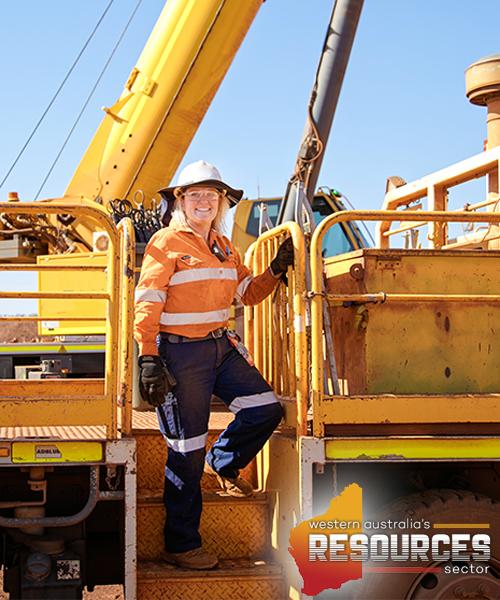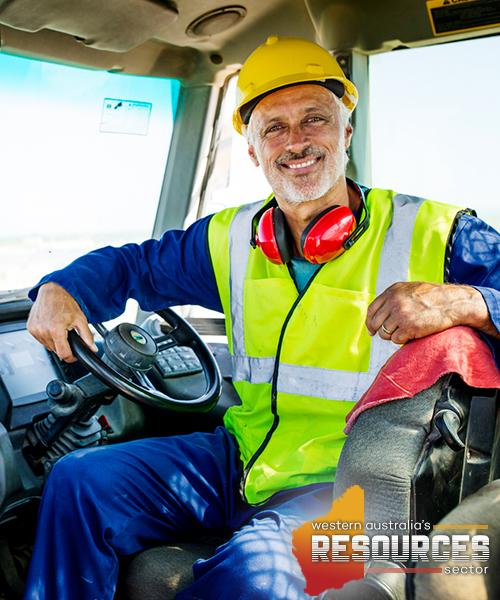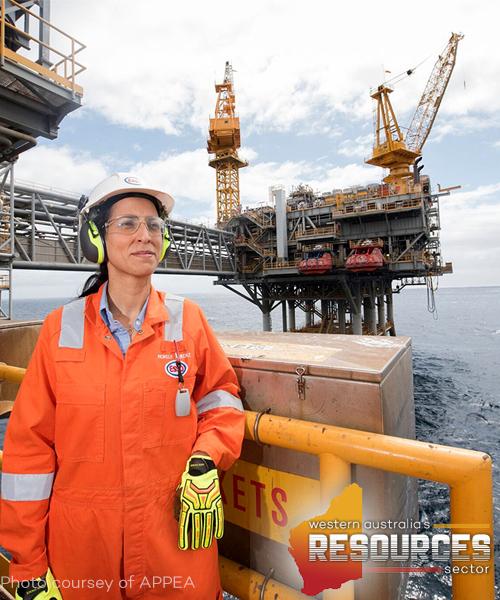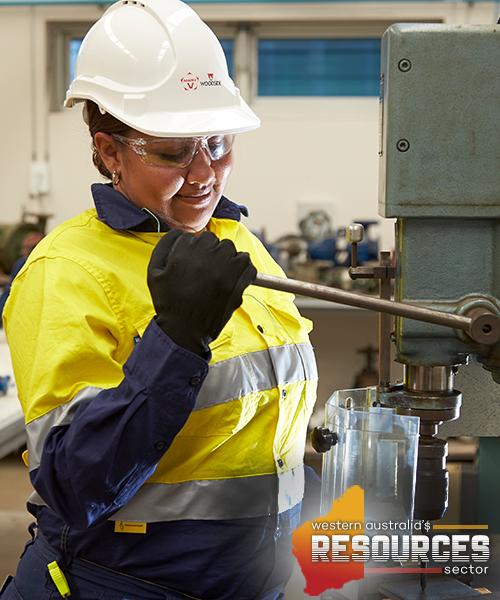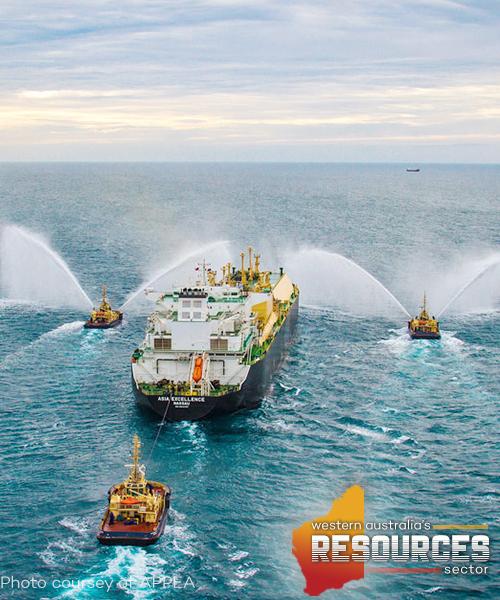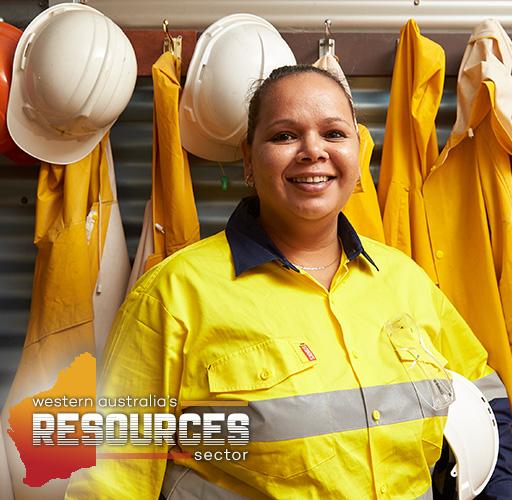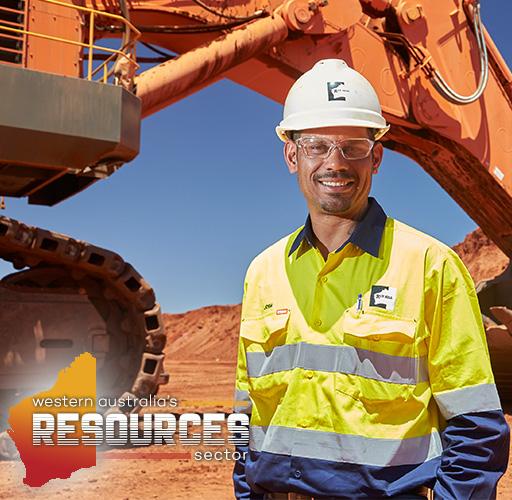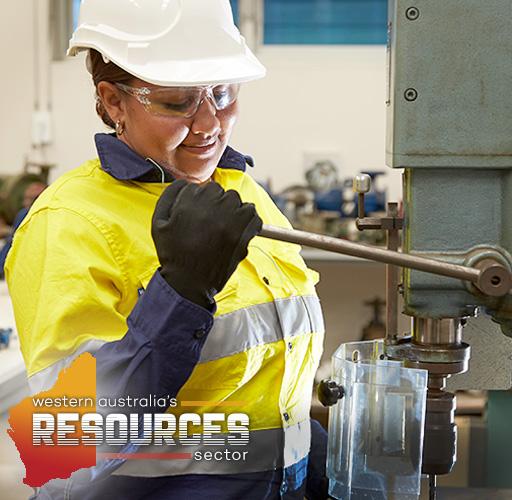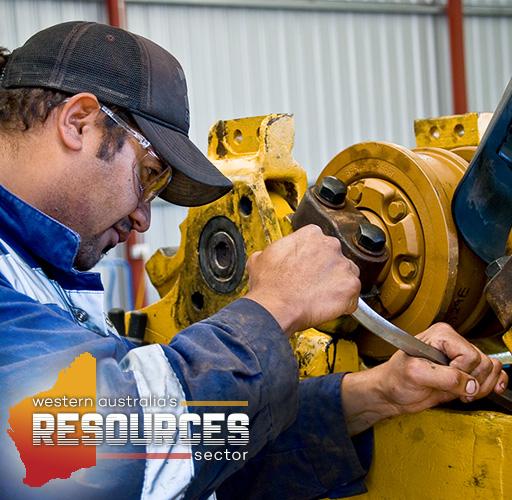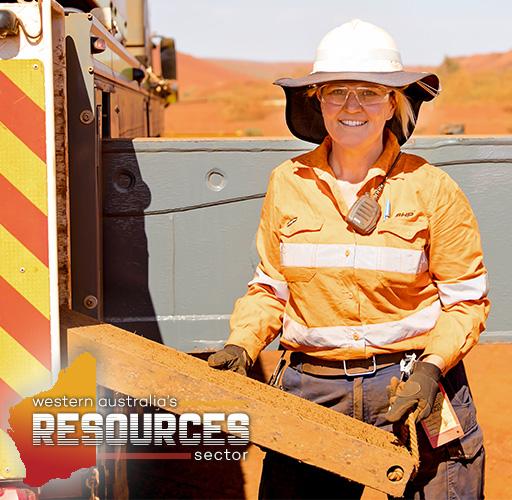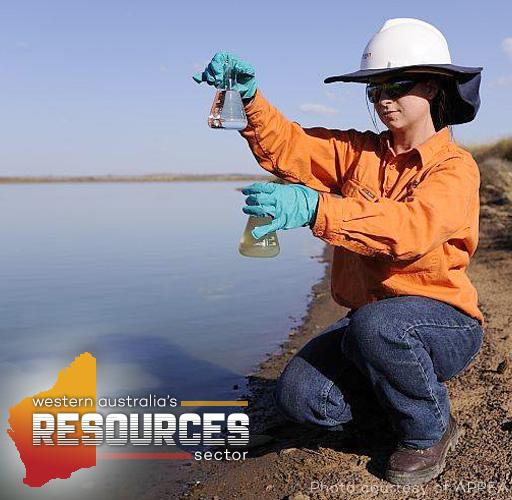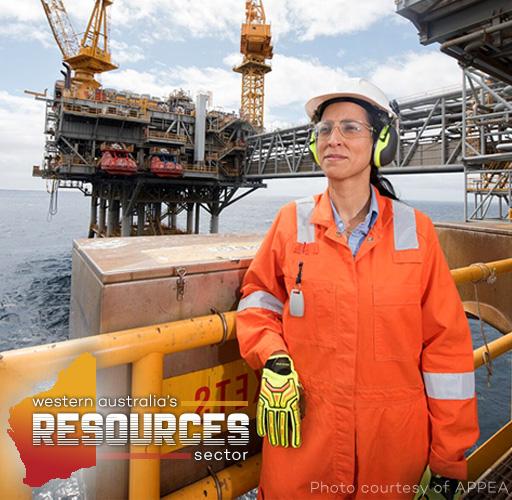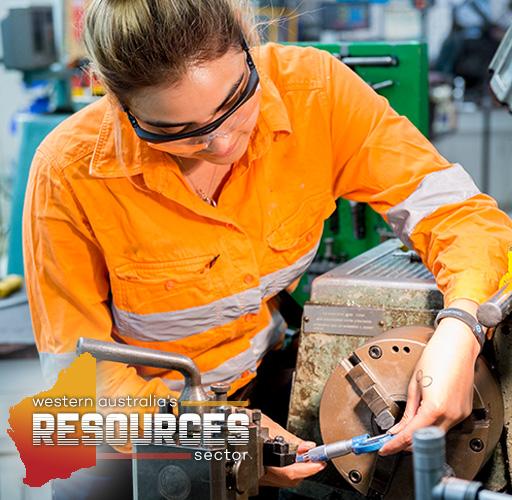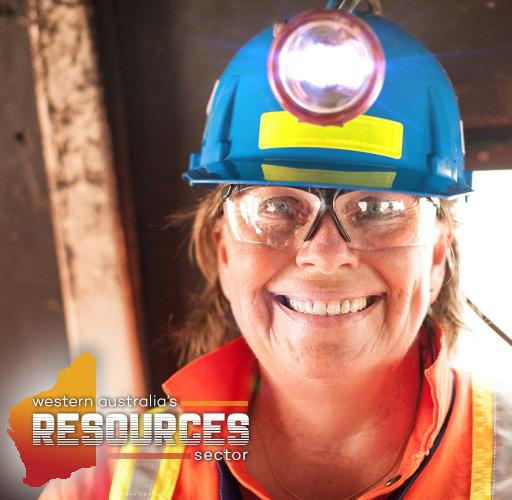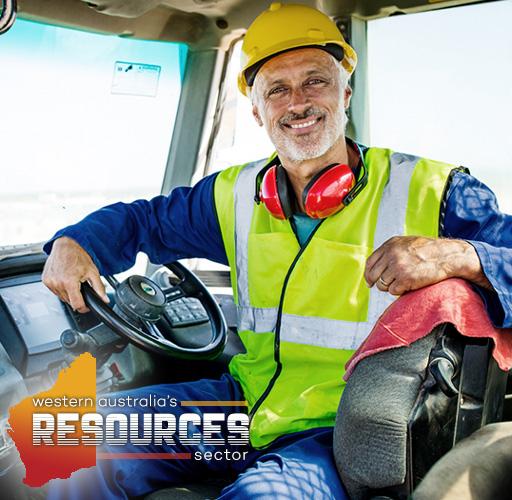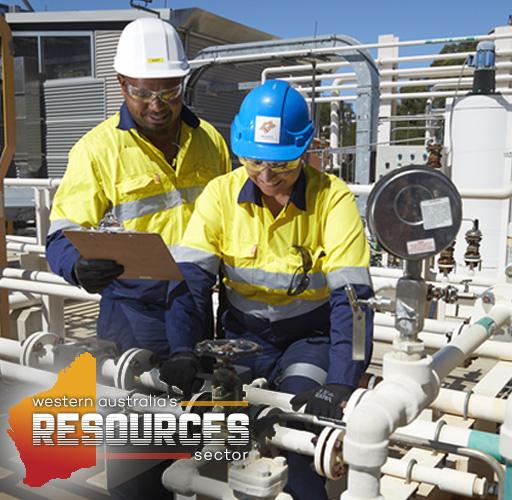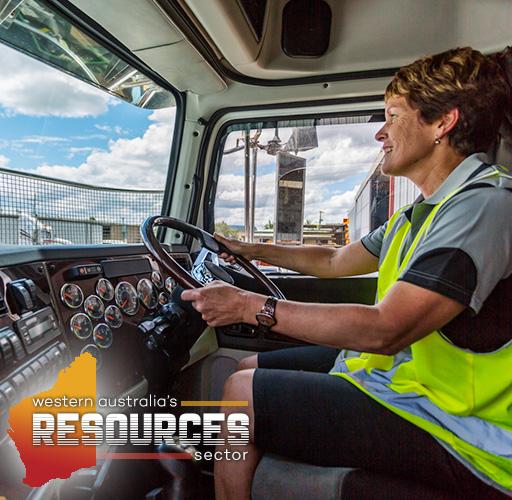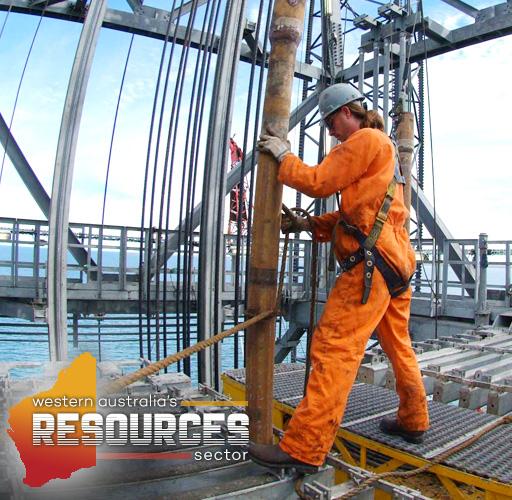If you're looking for fantastic employment and career opportunities, Western Australia's resources sector is where you need to be! The sector — which comprises mining, oil and gas — supports a diverse range of activity including the production of iron ore, natural gas, gold, alumina, nickel and lithium to name just a few.
As the sector continues to grow, there will be a high demand for semi-skilled and trade workers, as well as professional, technical and maintenance support workers. Whether you're a school leaver, a graduate, returning to the workforce or looking for a career change, there has never been a better time to explore the possibilities in the WA resources sector.
What the resources sector can offer you
|
|
|
|
|
|
This is what the resources sector is all about! And there's a wide range of occupations to explore — from onsite drillers and miners to offshore oil rig crew, mechanics, electricians, fitters, machinists and fabricators, through to technicians, engineers, environmental scientists and information technology specialists... something for everyone!
Add in exciting new technologies such as robotics, drones and automation, and the move towards renewable and sustainable energy sources, the opportunities are endless. Follow the links below to find out more.
Jobs and careers
- WA's resources sector — Fast facts
- How do I get a job in the resources sector?
- Occupations and careers in the resources sector
- Where are the jobs in WA?
- Opportunities for Aboriginal people
- Opportunities for women
- Opportunities for all ages, all stages
- Jobs of the future
- Natural gas: Jobs you may not think of!
Skilling up
- Training options and pathways
- Training for the resources sector
- Getting an apprenticeship or traineeship
- Training for career success
- Training for an automated workplace
- Simulated underground mine training
- Women in Engineering scholarship program
- Looking for training, jobs or career advice? We can help!
How we can help
Looking for a job in the resources sector? Or maybe you're looking for a career change, or a career move, and wondering whether this is the industry for you? With so many different job opportunities across the sector, and a range of training options available, it's sometimes difficult to work out which path to follow. That's where your local Jobs and Skills Centre can help!
There's 15 JSCs located across metropolitan Perth and throughout regional WA, and outreach services are also available in regional areas. Each centre works closely with their local community, businesses and employers, and they know where the jobs are — including apprenticeships and traineeships. Whether you need help with your career planning, want to freshen up your CV, could use some tips for writing a winning job application, or help to figure out what kind of training will help meet your goals, have a chat with your local JSC. All services are free!

WA's resources sector — Fast facts
- There's over 150 different occupations in Western Australia's resources sector, providing opportunities and lifelong careers for people with a wide range of interests, skills and experience
- WA is one of the most productive mineral and petroleum regions in the world, with over 50 different minerals mined, and produces a significant proportion of the world’s minerals and petroleum commodities — A$167.3 billion of mineral and petroleum products in 20191
- Wages in the resources sector are the highest of all Australian industries – more than double the average wage2
- Our resources sector is only getting stronger — a record average of 135,000 people were employed during 2019—203, a significant increase from the previous year, and the sector stayed strong throughout the COVID-19 pandemic to deliver sales valued at a record $172 billion4
- There's over $100 billion worth of projects in the pipeline for the sector, creating future jobs
- The resources sector is the largest employer of environmental professionals in Australia
- Nearly 14,500 businesses and 872 community organisations in WA were supported by the WA resources sector in 2018/191

The Chamber of Minerals and Energy of Western Australia (CMEWA) is the peak sector representative body in Western Australia. CME leads policy development on issues impacting the sector, promotes the value of the sector to the community, and works collaboratively with industry to support the sector.

The Australian Petroleum Production & Exploration Association (APPEA) is the peak national body representing Australia’s upstream oil and gas sector. APPEA works collaboratively with industry and the community to improve business practices and economic, safety, environmental, and social performance.

The WA Department of Mines, Industry Regulation and Safety (DMIRS) supports a safe, fair and responsible future for the community, industry and resources sector. You can find a lot of useful information about the sector on their website, including a range of documents, publications and statistics.

How do I get a job in the resources sector?
Good question! First, let's think about the following four points.
With such a range of jobs available in the resources sector, the first step is to decide what kind of work you would like to do. It would also be useful to consider whether you're keen on getting into mining, or oil and gas, as the work environments can be very different — for example, do you like the idea of working offshore on an oil rig.. or do you think working underground would be exciting?
A good place to start is our occupational profiles, but you can also take a look through the following useful websites.
- Job outlook
- Skills Road: Resources sector career snapshot
- Your Career: Overview of the mining industry
Get social!
We also recommend following CMEWA on Facebook (@chamberofmineralsandenergywa). They post a lot of useful and interesting industry and careers information, and employment opportunities.
For a national perspective on the mining, oil and gas industry and career information, you can follow APPEA on Facebook (@APPEALtd).
Some entry level jobs in the resources sector don't require any particular skills or experience, but if you're after a particular occupation or looking to make a career move then skilling up through training is the way to go.
Right now there's 180 qualifications with course fees slashed by half or more under the Lower fees, local skills program... and even better, there's an annual cap on course fees, so you can super size your study but only pay as little as $400 for the year if you are under 25 or looking for work!
Please note: To get into some jobs in the resources sector, you'll need to complete an apprenticeship or traineeship. See below for more information about this.
While the resources sector does offer many jobs that don't require a trade or qualification, and for some occupations you can work your way up to specialist roles through learning on the job, some types of work require specialist skills and knowledge or you'll need to be trades qualified — these jobs are offered through an apprenticeship or traineeship.
With an apprenticeship or traineeship, you will complete a program of work and training over a period of time (generally two to four years). You are employed, and paid, during this time.
Take a look at Getting an apprenticeship or traineeship for more information
Because the WA resources sector is rapidly growing, the demand for skilled workers has never been higher! Most job opportunities are advertised online — here's some places to start your search.
- The Jobs and Skills WA jobs board
- The SEEK website
- indeed.com job search website
- Programmed (mining, oil and gas jobs)
- The Resources Hub (search 'current vacancies')
There's also some companies who specialise in recruitment for the resources sector. We recommend doing an internet search to find out more about what services they offer for jobseekers. And if you're on social media, there's several groups on Facebook and Instagram that regularly post job opportunities in mining, oil and gas, and other related areas — do a search to find them.
If you're in Karratha, or looking for work there, the Karratha local jobs website has a free jobs board!
Top tip: Sometimes the best approach is a direct one — most of the major resource sector companies operating in WA advertise job opportunities on their website, and/or their social media pages. Make a list of the companies you're interested in, and do an internet search to find them. Or check the list of CMEWA members here, for a helpful list of links.
If you’re interested in working in the resources sector, your local Jobs and Skills Centre can help with free advice on career planning and training to help you get there.
And if you've spotted a job you want to go for, they can help freshen up your CV and even help you put your job application together. Need some tips for job interviews? They can do that too!
Because Jobs and Skills Centres work closely with local employees and industries, they know where the jobs are and how you can get them. And they know what employers are looking for. There's 13 JSCs across Perth and regional WA, and all services are free. Call your local JSC on 13 64 64, or check our map to find your closest centre.
Occupations and careers in the resources sector
Now is a great time to consider a career in the WA resources sector! Jobs and occupations are vast and varied — so when considering career options, it's helpful to know about different occupations and the kind of work they involve.
What will be a good fit with who you are and what you want for your future? Will you need new skills to get into a particular occupation or job? To help answer these questions, we have over 550 occupation profiles you can browse through — including those in the resources sector. You could also look for occupations that support the sector — for example; the staff on a mine site includes chefs and cooks, cleaners, electricians, plumbers and many others.
To look for an occupation, use the keyword search option below, or visit our Occupation profiles page for other search options including an A—Z list.
The impact of COVID-19 is an unprecedented situation that will impact our ability to report accurate course information and employment trends at this time. Some employment trends and course availability information provided in occupation profiles may not be current.
Where are the jobs in WA?
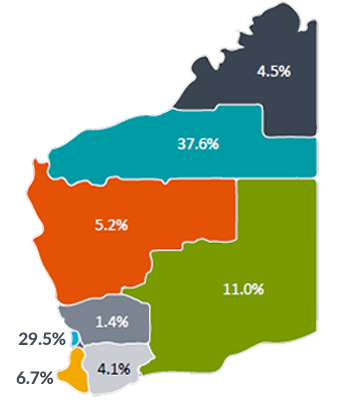
This map5 shows the location of resources sector employees, across Western Australia.
- Pilbara region: 37.6%
- Perth: 29.5%
- South Eastern WA: 11%
- South West WA: 6.7%
- Central WA: 5.2%
- Kimberley region: 4.5%
- Great Southern region: 4.1%
- Midlands region: 1.4%
Fly in fly out (FIFO), drive in drive out (DIDO), residential, full time and part time job opportunities are available across the entire state. Many leading employers offer flexible work arrangements so that all employees can enjoy a rewarding lifestyle.
Sources
1 CME WA website as of 8 October 2020
2 Department of Industry, Science, Energy and Resources website as of 8 October 2020
3 Media statement from Hon Bill Johnston MLA, WA Minister for Mines and Petroleum; Energy; Industry Relations: 25 September 2020
4 WA Department of Mines, Industry Regulation and Safety website as of 1 October 2020
5 Map of WA jobs: CMEWA Diversity in the WA Resources Sector 2019 report (data from a total of 55 WA resources sector organisations)
Opportunities for Aboriginal people
The resources sector in Australia has the largest proportion of Aboriginal and Torres Strait Islander peoples employed, higher than any other industry. In WA, employment in the resources sector is mostly in regional areas, so for many people that means you can stay close to country and not have to travel far from family and community. As an example; the Pilbara region has over 37 per cent of the jobs in WA's resources sector, but 68% of its Indigenous employees.
Many employers have programs such as apprenticeships and traineeships for Indigenous peoples, which offer fantastic opportunities to achieve a trades or professional qualification. And if you're still at school, doing an Aboriginal school-based apprenticeship or traineeship in Years 11 and 12 can get you job ready when you finish your studies.
If you're considering a job in the resources sector, your local Jobs and Skills Centre can help you with information and advice on options for work and training and help connect you with employers. They can even help you put together a deadly CV and apply for jobs, and all services are free! Call your local JSC on 13 64 64, or find out more here.
Career inspiration: Ryan Cobb
Ryan works for Woodside Energy in Karratha on Ngarluma country, his grandmother’s country. He is Australia’s first Indigenous Master Mariner, which means he can command any ship, of any size, in any ocean anywhere in the world. Starting work as a pearl diver in Broome when he was 18 years of age, Ryan has always had a passion for working at sea. Woodside offered him an opportunity to train on offshore vessels, where he was also able to mentor young Indigenous people, and that started his career in the resources sector.
Ryan has now set himself a goal to become the first Indigenous Australian marine pilot for an LNG (liquified natural gas) tanker. His career story is a great inspiration for Aboriginal people, and highlights the opportunities available in the resources sector through training. Hear more of his story in this short video from Woodside Energy's YouTube channel.
Opportunities for women
The number of women in the WA resources sector has been growing over the past few years — reaching 20 per cent in 2019. Many employers across the sector are actively seeking to increase female participation, and some offer opportunities such as scholarships and apprenticeships or traineeships exclusively for women.
The face of management and leadership across the sector is also changing — traditionally male led, we now see many women in these roles. Perth is the leading location for women in the sector, with over 50 per cent of the female workforce based in the metropolitan area, however there is a range of job opportunities for women both on site and in corporate roles across the state.
In years past jobs required mostly fly in-fly out (FIFO) workers however many leading employers now offer more family-friendly support — for example; more flexible working rosters, suitable accommodation and on site child care services — to encourage more women into the sector, and many jobs no longer require being on a remote worksite.
Women in the resources sector: Jennifer's story
Jennifer made a big career move in 2015 and joined Newmont Australia, leaving behind a lengthy career in education. Fast track five years and she's now a haul truck operator, crew trainer and Step Up supervisor. She was recently a finalist in the Chamber of Minerals and Energy of WA's Women in Resources awards, and went on to win the Australian Outstanding Tradeswomen, Operator/Technician at the 2020 Minerals Council of Australia National Women in Resources awards. Great career achievements!
Jennifer encourages young girls and women to dream big — set your goals, stay focused, accept the challenges and you can achieve anything! Hear more of her story in this short video from CMEWA.
Opportunities for all ages, all stages
One of the great things about an industry as large and diverse as WA's resources sector, is that there's opportunities for people from all walks of life; all ages, all stages.
Changing careers? Whether you're making a career move voluntarily, or you've recently lost your job, you have skills and experience that will be valued in the resources sector. Are you starting new, moving up, or looking for something completely different to what you've been doing before? What opportunities suit your goals?
Returning to work? Maybe you've been unemployed for a while, or you've been raising a family... whatever your story, there's a place for you in the resources sector. Sure, things have changed since you were last working — but you will have skills and knowledge that are not only relevant but also transferrable.
Young, or just starting out? Getting your first job is a big deal, and making the right choices can set you up with a career for life. While some jobs in the resources sector require some experience, there's plenty of opportunities for you too! And if you're still at school, you can start your career journey with a school-based apprenticeship or traineeship in Years 11 and 12 and be job ready when you finish your studies.
Mature aged? Age doesn't have to be a barrier to career opportunities — in fact, many employers will value your maturity and experience. Some companies actively recruit for mature aged apprenticeships and traineeships, which can be a great option if you don't have the specific skills and knowledge required for a particular job.
From retail to refinery: A career change story
Verushka made a big career change — leaving four years in the retail industry behind her, to pursue an apprenticeship at Alcoa's Kwinana alumina refinery. She says one of the things she enjoyed most about her apprenticeship was coming back into learning, and getting her brain working again, and she also appreciated her TAFE lecturers taking the time to explain things clearly and share their industry experience.
Now that she's a trade qualified mechanical fitter, Verushka enjoys having the confidence to pick up the tools at home and even service her own car! She loves the variety in her work, and problem solving how to fix things, and encourages people to have a go at working in the resources sector.
Hear more of Verushka's story in this short video from CMEWA.
How we can help
Whatever your situation, the first step is working out the pathway that suits you best — maybe a short course, or a pre-apprenticeship to get you skilled up, an entry-level job for now until you can grow your skills and experience, looking for a job that's similar to work you've done before, or going straight into a job that you're already qualified for. You can feel confident that there's a job for you in the resources sector!
Your local Jobs and Skills Centre can help you with information and advice on options for work and training, and help connect you with employers. They work with jobseekers from all kinds of backgrounds, and they understand the challenges — whether you've been out of the workforce for a while, looking for your first job or changing careers they can help you to figure out the best path to take.
Your JSC team can also help you put together a CV and apply for jobs, and even help you prepare for job interviews so that you'll feel confident to get that job. They're also experts in career starter options including apprenticeships and traineeships. And best of all... all services are free! Call your local JSC on 13 64 64, or follow the link below to find your local centre.
Jobs of the future
This video, which featured on Channel 9 News in July 2019, talks about jobs for the future being created in WA's resources sector. It also highlights that the work in the sector is changing — no longer all about mine sites and FIFO work, many jobs are now centralised through the introduction of automation and new technologies, and the range of occupations is more diverse.
Even though some of the sector's jobs of the futures don't currently exist, they're coming soon! And many current jobs are changing, along with work practices and processes — particularly in relation to new technologies. Sustainability, environmental responsibility and alternative and renewable energies are also becoming key areas of focus across the industry.
Training is already available to build the skills needed for these future jobs, which means there's fantastic opportunities to skill up and be ready for when they're here. Now is the time to get skills ready for future jobs in the resources sector!
Natural gas: Jobs you may not think of!
Over five million homes in Australia use natural gas every day — from hot showers to cooking, it's fast becoming a preferred energy source. But when it comes to jobs in the natural gas industry, do you see it as being all about hard hats and hi-vis? Well.. think again!
The natural gas industry is made up of hundreds of diverse and highly skilled jobs, and utilises the latest in technology. And while it has plenty of career opportunities for skilled workers, it also has some of the most interesting jobs around — jobs you may only have dreamed of! From environmental scientists, to offshore and onshore drone operators, deep sea divers who maintain rigs and pipelines, and even helicopter pilots who transport people on and offshore — it's an exciting field to get into.
This short video from Brighter provides a quick industry overview, and highlights some of the career opportunities available.

Training options and pathways
When it comes to getting a job in the resources sector, having skills and knowledge can really give you the edge over other jobseekers. There's a range of vocational education and training courses available at WA TAFEs and private training providers that can set you up to be job ready with the skills and knowledge that employers are looking for.
Once you have identified the type of work you are interested in, and/or the occupation you're going for, you can find a course or qualification that offers the skills and knowledge you'll need to be job ready.
Training for the resources sectorThere's a course or qualification for almost every job in the resources sector — from drillers to engineers, plant mechanics to process plant operators, metal fabricators to ship's captain, machinists to electricians, and everything in between! And there's never been a better time to get into training, with course fees slashed by half price or more on a range of qualifications through Lower fees, local skills! There's also a great range of free* short courses and skill sets available. For information about free short courses and skill sets, and a full list of all Lower fees, local skills qualifications, please visit our Skills Ready page. |
*Free for eligible students. Please visit our Skills Ready page for full details.
Getting an apprenticeship or traineeship
While the resources sector does offer some entry level jobs that don't require a trade or qualification, and for some occupations you can do a course to learn the skills needed or work your way up to specialist roles through on the job experience, some types of work require specialist skills and knowledge or you'll need to be trades qualified — these jobs are offered through an apprenticeship or traineeship.
Getting experience without a job is not easy... right? That's where apprenticeships and traineeships come in! You combine work with training, you're employed so you'll earn while you learn, and you come out not only skilled and experienced but also with a nationally recognised qualification. And there's even pre-traineeships and pre-apprenticeships, which can be your pathway into a full apprenticeship or traineeship, or school-based apprenticeships and traineeships that you can complete in Year 11 and 12 for a headstart on your career! Take a look at the following information to find out more.
A school-based apprenticeship or traineeship (SBAT) is an employment-based learning pathway for secondary school (Years 11 and 12). It combines off the job training at a TAFE college or training provider, and paid on the job training through a work placement, that leads to a nationally recognised qualification and can count towards your WACE. An SBAT is designed to give you skills and knowledge in your chosen field or while you're still at school, to give your career a head start. There's also the Aboriginal school-based apprenticeship/ traineeship program, for Aboriginal students in years 10, 11 and 12.
SBATs are available in a range of study areas, including many that are relevant to the resources sector.
To find out more about SBATs, you can visit our Still at school page here, speak to your school, or call your local Jobs and Skills Centre on 13 64 64 for free information and advice.
A pre-apprenticeship or pre-traineeships is a Certificate II program that includes a work placement component, coordinated by your TAFE or training provider. You will get industry specific training, combined with hands-on experience in a real workplace, to gain valuable industry skills and knowledge that will prepare you for employment and make you more competitive when applying for jobs or a full apprenticeship or traineeship. It also gives you an opportunity to find out whether a particular industry or type of work is right for you.
Do I have to do a pre-apprenticeship/traineeship to get an apprenticeship/traineeship?
No, there is no requirement to have completed a pre-apprenticeship or pre-traineeship before starting an apprenticeship or traineeship. However, if you do go on to a full apprenticeship or traineeship you may receive credit for the units you have completed, which could shorten the time it takes to complete a full traineeship or apprenticeship.
There are many pre-apprenticeship courses on offer at TAFE colleges and training providers, in a range of study areas related to the resources industry. Course fees do apply, but right now there's a range of pre-apprenticeships with half price course fees, with some pre-apprenticeships and pre-traineeships under $200, through the Skills Ready Lower fees, local skills program.
Take a look at our resources sector course list to see what pre-traineeships are available with half price course fees (select the 'half price' icon), or browse our full course list here.
Apprenticeships and traineeships are an excellent way to combine training with work, enabling you to have a job — earn while you learn — as you complete training towards a nationally recognised qualification. They are available to anyone of working age — you can do an apprenticeship or traineeship if you are a school-leaver, re-entering the workforce, or as an adult or mature-aged person wishing to change careers. When you finish your apprenticeship or traineeship you will have a nationally recognised qualification.
Apprenticeships typically take two to four years to complete and traditionally cover skilled trade areas such as automotive, engineering, electrotechnology, and building and construction. An apprenticeship is a structured program with a combination of on the job training, where you gain hands-on skills and knowledge, and off the job training at a TAFE or training provider. Your off the job training may be scheduled on a weekly or monthly basis (eg; one day per fortnight), or as a block release across the year — for example; you might work full time for six weeks and then do a two-week block of training. Upon successful completion, apprentices become a qualified tradesperson.
Traineeships can take between one to two years to complete and offer a broad range of vocational and occupational choices — anything from business and finance, human resources, multimedia and information technology, through to sport and fitness, agriculture, hospitality and civil engineering. A traineeship is a structured program with a combination of on the job training where you gain hands-on skills and knowledge, and off the job training at a TAFE or training provider. Your off the job training may be scheduled on a weekly or monthly basis (eg; one day per fortnight), or as a block release across the year — for example; you might work full time for six weeks and then do a two-week block of training. Upon successful completion, trainees receive a nationally recognised qualification in their chosen vocational area.
Take a look at our resources sector course list to see what apprenticeships and traineeships are available, including some with half price course fees (select the 'half price' icon), or browse our full course list here.
To do an apprenticeship or traineeship, you must be employed. So how do you find an employer?
- You can go out and find an employer yourself, by searching for advertised jobs or contacting a company directly. Many of the larger employers in the resources sector run regular recruitment programs for apprenticeships and traineeships — check How do I get a job in the resources sector? for more information to help you with this.
- There are a number of Australian Apprenticeship Support Network (AASN) providers in WA that are funded by the Australian Government to provide advice and assistance to help you find an apprenticeship or traineeship and organise everything to get you started.
You can find out more on our Apprenticeships and traineeships page here, or call your local Jobs and Skills Centre on 13 64 64 for free information and advice.
There's also some great information on the Australian Apprenticeships website about finding an apprenticeship or traineeship, including some useful tips for how to approach employers.
Another option is to find an apprenticeship or traineeship through a group training organisation (GTO).
GTOs employ apprentices and trainees across a range of different industries. You are directly employed by the GTO, but they 'host' you out to an employer for work. This can be a great option as you may have the opportunity to work with more than one employer during your apprenticeship or traineeship — giving you a wider range of experience. GTOs are experts in hiring apprentices and trainees, and are regulated to make sure they are doing the right thing by their employees.
Step 1: Register with a GTO
You can look through our list of WA GTOs here, and check their information to find what industry/sector and/or type of apprenticeship or traineeship they specialise in. The next step is to register with the GTO (you can register with as many as you like) so that they have your details if a suitable vacancy arises.
Step 2: Recruitment process
You will have an initial interview with the GTO, so that they can find out more about the type of apprenticeship or traineeship you're looking for and discuss options. If you are suitable, the GTO will either offer you an apprenticeship or traineeship or let you know when one becomes available.
When you start your apprenticeship or traineeship, your GTO will help you prepare to meet your host employer. They will also provide any pre-employment training that's required; such as workplace health and safety, and the basic personal protective equipment (PPE) needed for the role.
After you start your apprenticeship or traineeship, the GTO will assign you a field officer who will be your direct contact point if there's any issues or if you have any queries about your apprenticeship or traineeship. Your field officer will also monitor your training and work, and check in to make sure that everything is going smoothly.
All aspects of your apprenticeship or traineeship through a GTO are the same as any other apprenticeship or traineeship — it's really only the actual employment arrangements that are different; ie you are employed and paid by the GTO rather than by the company where you're doing the apprenticeship or traineeship.
Training for career success
Meet Bethany Clarke, the WA Training Awards Apprentice of the Year 2020. Bethany completed her Certificate III in Process Plant Operations apprenticeship and says this career path appealed because it allowed her to progress her education, learn on the job and gain valuable experience, become financially independent, grow as a person and be more confident, and lead the way in a male-dominated industry.
Bethany is now working offshore with one of the largest oil and gas companies in the world, and completing an online commerce degree majoring in management and human resource management for her career goal of working up to a leadership role. In this short video, she talks about her apprenticeship experience, and what she loves about working in the resources sector.

Training for an automated workplace
The resources sector is a global leader in the development and application of autonomous technologies such as drones, advanced sensors, fully autonomous railway systems and driverless trucks. Autonomous technologies are greatly improving health and safety conditions for operators and supporting an industry need for mining approaches with minimal environmental impacts. These exciting changes are creating new and different jobs, and new skills are needed for the current and future workforce.
In partnership with Rio Tinto, South Metropolitan TAFE has developed two new automation qualifications — the first accredited in Australia. These courses can set you up to take full advantage of the many exciting opportunities automation is delivering to the resources sector, and give you job ready skills.
Half price course fees!
This new qualification marks a shift in WA industry towards innovative technologies, requiring new roles and specialist skills.
It covers how automation is innovating mobile and fixed plant operations, and includes an introduction to Programmable Logic Controllers (PLCs) and process control operations.
Free for eligible students!
This short course offers a skill set that workers and apprentices can use to improve or upgrade their skills in automation to match future workforce and industry needs, and get you job ready with some entry level skills.
Simulated underground mine training
North Metropolitan TAFE is one of the largest mining and resource trainers in WA, and they have something unique at their Perth campus!
The CUT Mine is a simulated underground mine — the first of its kind in WA. The mine provides students with real-life experience of working underground, to gain exposure to a real underground mine environment. This not only helps students feel more confident and safe when they actually get on to the mine site, but also teaches important safety skills. The CUT Mine has also been used by industry for mine induction training and mines emergency rescue competition
Take a look at this short video about the CUT Mine, or you can go to the North Metropolitan TAFE website to find out more.
Women in Engineering scholarship program
Delivered by South Metropolitan TAFE in partnership with Chevron Australia, the Women in Engineering program provides skills for employment in WA’s oil and gas and resources industry. A key focus of the program is to provide an insight into oil and gas operations from a female perspective, and address barriers that may discourage women from entering the industry. The program awards a Certificate III in Process Manufacturing on completion and covers a range of skills and knowledge including engineering design principles, technology and practices.
The program, which is fully funded through a scholarship for successful applicants, includes workplace visits and access to female role models and industry experts from the resources sector. To boost their career opportunities, participants also have the option to complete the the Certificate II in Process Plant Operations qualification, which will also be fully funded under the scholarship.
Watch this short video to find out more, and visit the South Metropolitan TAFE website for further information about program availability.

Looking for training, jobs or career advice? We can help!
If you're interested in working in the resources sector, your local Jobs and Skills Centre can help with free advice on training and career planning to help you get there! And because they work closely with local employees and industries, they know where the jobs are and how to help you get them. Whether you need help freshening up your CV, writing a job application, or deciding what training course is the best option for you — your JSC can help!
There's 13 JSCs located through metropolitan Perth and regional WA, and outreach services are also available in regional areas. All services are free, and JSCs are located throughout metropolitan Perth and regional WA.



